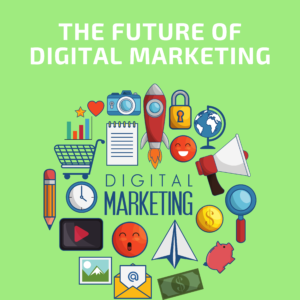Introduction:
In today’s dynamic and hyper-connected world, which boasts 5.30 billion Internet users having a website for business is essential, digital marketing has emerged as a cornerstone for the success and sustainability of businesses across diverse industries. The advent of the internet and digital technologies has transformed how companies engage with their audience, market their products or services, and drive growth.
In this rapidly digitizing world, establishing a robust online presence has become imperative for the success and growth of any company. A key component of this digital presence is a well-designed and functional website for business. In this blog, we’ll dive into why businesses of all sizes and industries need a website. Think of it as your business’s digital storefront – an essential tool that helps you connect with customers, expand your reach, and stay competitive in the modern marketplace. Let’s explore how having a website for business goes beyond being just an option and becomes a fundamental asset for growth and success.

Let’s Understand what a website is and its purpose-
A website is like a digital home for businesses or individuals on the internet. It’s a collection of web pages with information, images, and sometimes videos, accessible through a specific web address. People use websites to share things like who they are, what they do, or what products and services they offer. It’s a place where visitors can learn, connect, and interact with the content provided by the website owner.
How Does it Help Businesses?
24/7 Accessibility
Unlike traditional brick-and-mortar stores with fixed operating hours, a website is accessible 24/7. This continuous availability allows businesses to cater to a global audience across different time zones. Customers can browse products, gather information, and make purchases at their convenience, contributing to increased sales and customer satisfaction.
Credibility and Professionalism
In today’s digital age, consumers often turn to the internet to research products and services before making a purchase decision. A professionally designed website enhances a business’s credibility and portrays a level of professionalism. It serves as a virtual storefront, creating a positive first impression and instilling trust in potential customers.
Marketing and Branding
A website is a powerful marketing tool that allows businesses to showcase their products or services, share success stories, and communicate their brand identity. It provides a platform for businesses to implement various digital marketing strategies, such as content marketing, SEO, and social media integration, to increase visibility and drive traffic.
Cost-Effective Advertising
Compared to traditional forms of advertising, such as print or TV, online marketing through a website is more cost-effective. Businesses can leverage various digital marketing channels, like social media, email marketing, and content marketing, to promote their products or services to a wider audience without the hefty price tag associated with traditional advertising.
Customer Engagement and Interaction
Websites provide a platform for direct interaction with customers. Features such as live chat, contact forms, and feedback mechanisms enable businesses to engage with their audience in real time. This direct communication not only builds stronger customer relationships but also allows businesses to gather valuable insights for continuous improvement.
Data Analytics and Insights
Websites offer powerful analytics tools that provide businesses with valuable data about their online audience. From user demographics to website traffic patterns, these insights help businesses make informed decisions, refine marketing strategies, and optimize their online presence for better performance.
While having a website is undoubtedly crucial, it’s not a standalone solution. To truly thrive in the digital landscape, businesses need to take proactive steps to boost their online visibility. Here are some essential strategies to ensure that your website doesn’t get lost in the vast expanse of the internet.

1. Search Engine Optimization (SEO):
- Implementing SEO strategies is paramount for a website’s visibility. This involves optimizing content with relevant keywords, improving website speed, and ensuring a mobile-friendly design.
- Regularly update content, create high-quality backlinks, and leverage meta tags to enhance search engine rankings.

2. Social Media Integration:
- Social media platforms have become powerful tools for business promotion. Integrate social media buttons on your website to encourage sharing.
- Actively engage with your audience on platforms like Facebook, Twitter, Instagram, and LinkedIn. Share relevant content, respond to comments, and use social media advertising to target specific demographics.
3. Content Marketing:
- Create and share valuable, relevant content on your website. This can include blog posts, articles, infographics, and videos.
- Develop a content calendar and consistently produce content that addresses your audience’s needs and concerns. This not only improves your website’s visibility but also establishes your business as an authority in your industry.
4. Email Marketing:
- Build and maintain an email list to connect with your audience directly. Email marketing campaigns can include newsletters, promotions, and updates.
- Personalize your emails to make them more engaging, and use analytics to track the effectiveness of your campaigns.

5. Online Advertising:
- Invest in online advertising through platforms like Google Ads, Facebook Ads, or other relevant channels.
- Target specific demographics and use analytics to measure the return on investment. Adjust your ad strategy based on performance data to optimise results.
6. Local SEO:
- For businesses with physical locations, optimising for local search is crucial. This involves creating a Google My Business profile and ensuring accurate information across online directories.
- Encourage satisfied customers to leave positive reviews, as these play a significant role in local search rankings.
7. Regular Website Maintenance:
- Keep your website updated with fresh content, and ensure that all links are working correctly.
- Regularly check for and fix any technical issues, such as broken pages or slow loading times, to provide a seamless user experience.
8. Analytics and Data Monitoring:
- Utilize website analytics tools to monitor visitor behaviour, track conversion rates, and identify areas for improvement.
- Make data-driven decisions by analyzing the performance of different pages and adjusting your strategy accordingly.
Conclusion:
In the ever-evolving digital landscape, the significance of a well-designed website cannot be overstated for businesses. It is not merely a luxury but an essential component of a comprehensive strategy for success. The advantages are multi-faceted, ranging from global reach and constant accessibility to bolstered credibility and cost-effective marketing.
However, having a website for business is just the beginning of the digital journey for businesses. To truly thrive and stand out in the competitive online arena, active efforts towards enhancing online visibility are imperative. The amalgamation of strategic approaches, such as search engine optimization (SEO), social media integration, content marketing, and analytics-driven decision-making, is crucial in maximizing online presence and reaching a broader audience.
In essence, a well-designed website for business serves as the cornerstone of a business’s online presence, while strategic visibility-boosting measures act as the driving force behind its success. As we navigate the digital era, where consumer behaviour is shaped by online interactions, a website transcends being a mere tool; it emerges as a business imperative. To not only survive but thrive in this digital age, businesses must embrace the symbiotic relationship between a well-crafted online presence and the strategic endeavours that elevate their visibility in the vast digital landscape.
If you are interested in learning Digital Marketing, then Moving Digits is your one stop destination
Also if you want to learn organic farming Sapagro is the best choice for you.











